Business Law Report: UK Law, Business Structures, and Disputes
VerifiedAdded on 2020/10/23
|17
|5496
|173
Report
AI Summary
This report provides a detailed overview of UK business law, commencing with an introduction to the subject and its relevance. It explores the concept of parliamentary sovereignty and various sources of UK law, including legislation, common law, European Union Law, and the European Convention on Human Rights. The report examines the roles of government in the law-making process and how statutory and common law are applied in justice courts. It then analyzes the impact of company law, employment law, and contract law on businesses, and discusses the nature and formation of different business types, comparing unincorporated and incorporated businesses. Furthermore, the report includes case studies on contract breaches and alternative dispute resolution. The report concludes with a synthesis of the key findings and provides a list of references.
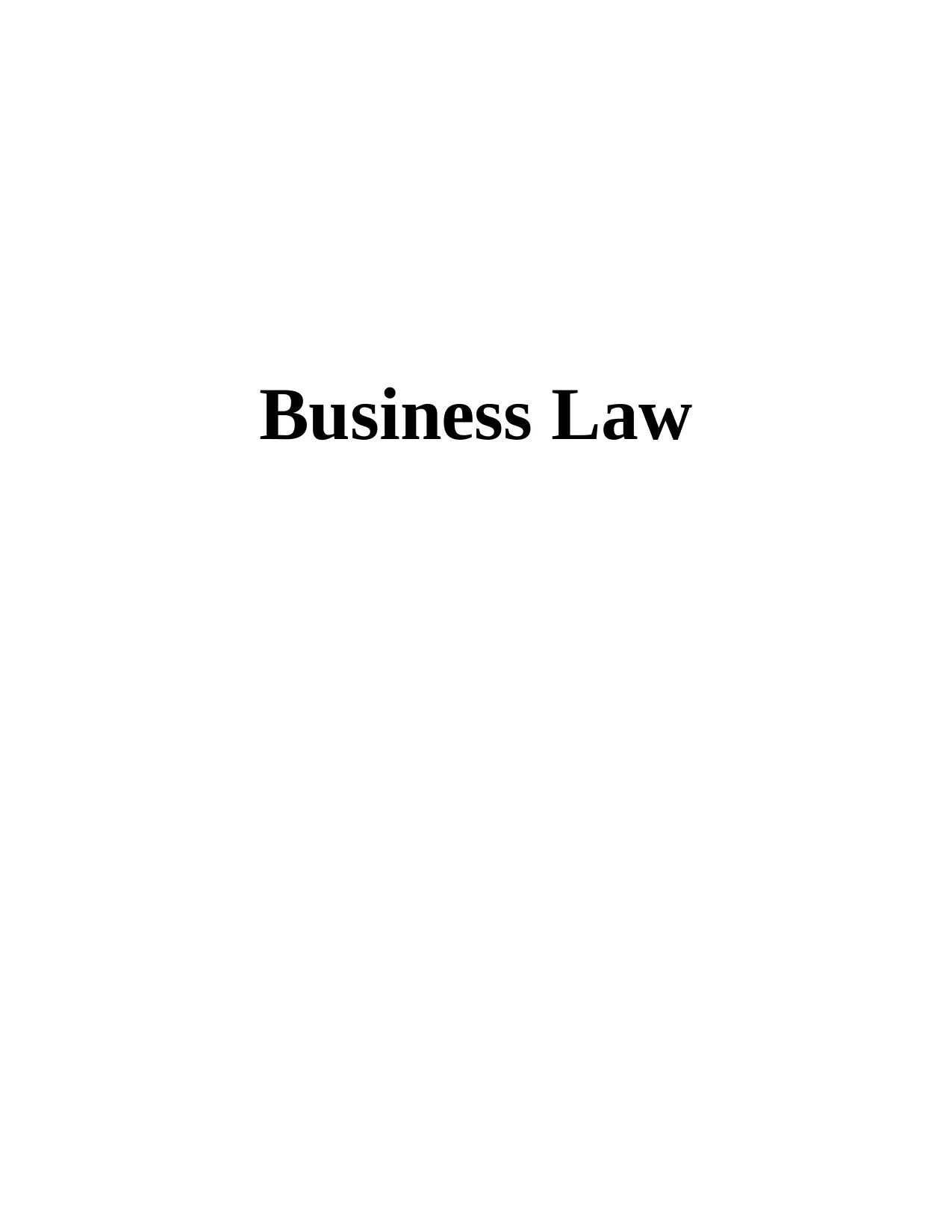
Business Law
Paraphrase This Document
Need a fresh take? Get an instant paraphrase of this document with our AI Paraphraser
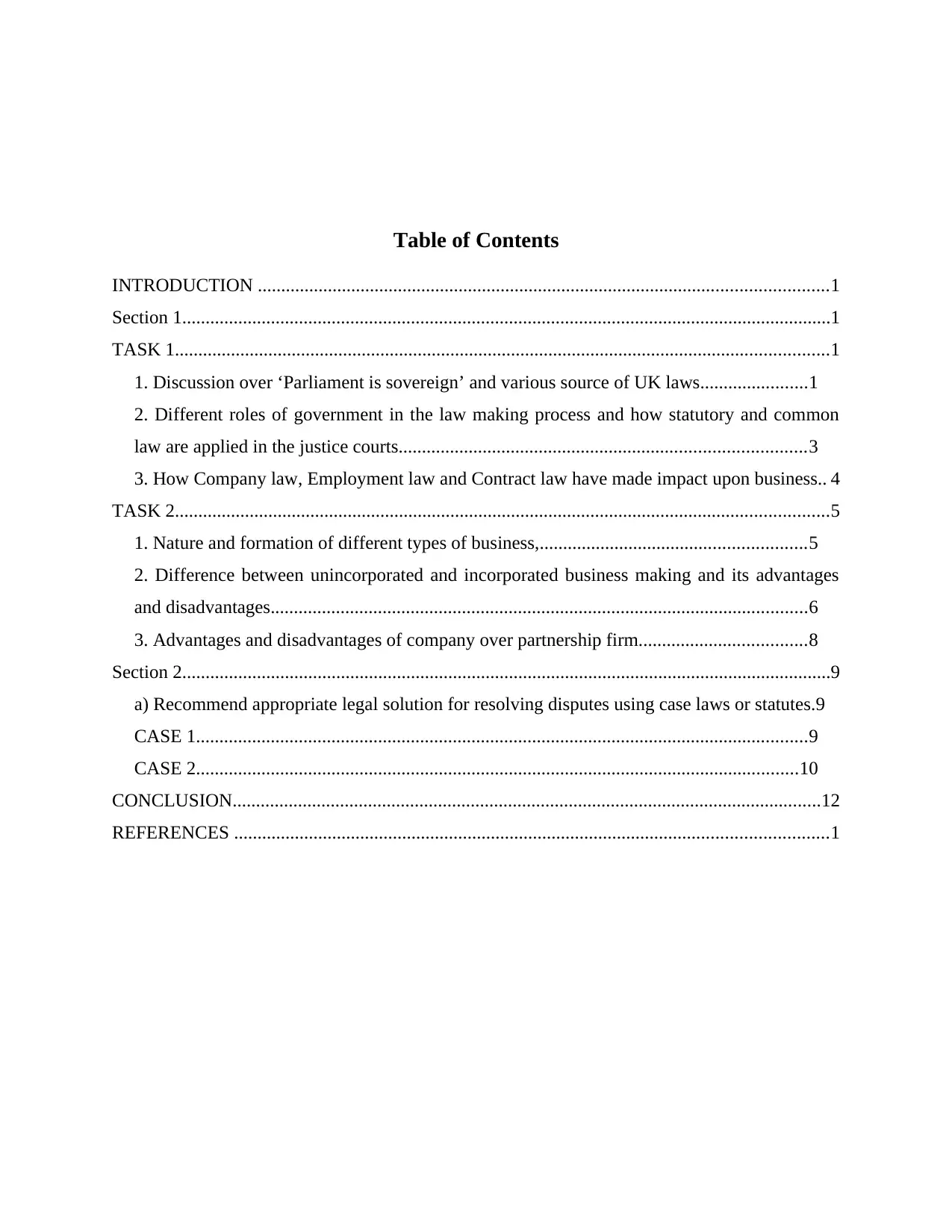
Table of Contents
INTRODUCTION ..........................................................................................................................1
Section 1...........................................................................................................................................1
TASK 1............................................................................................................................................1
1. Discussion over ‘Parliament is sovereign’ and various source of UK laws.......................1
2. Different roles of government in the law making process and how statutory and common
law are applied in the justice courts.......................................................................................3
3. How Company law, Employment law and Contract law have made impact upon business.. 4
TASK 2............................................................................................................................................5
1. Nature and formation of different types of business,.........................................................5
2. Difference between unincorporated and incorporated business making and its advantages
and disadvantages...................................................................................................................6
3. Advantages and disadvantages of company over partnership firm....................................8
Section 2...........................................................................................................................................9
a) Recommend appropriate legal solution for resolving disputes using case laws or statutes.9
CASE 1...................................................................................................................................9
CASE 2.................................................................................................................................10
CONCLUSION..............................................................................................................................12
REFERENCES ...............................................................................................................................1
INTRODUCTION ..........................................................................................................................1
Section 1...........................................................................................................................................1
TASK 1............................................................................................................................................1
1. Discussion over ‘Parliament is sovereign’ and various source of UK laws.......................1
2. Different roles of government in the law making process and how statutory and common
law are applied in the justice courts.......................................................................................3
3. How Company law, Employment law and Contract law have made impact upon business.. 4
TASK 2............................................................................................................................................5
1. Nature and formation of different types of business,.........................................................5
2. Difference between unincorporated and incorporated business making and its advantages
and disadvantages...................................................................................................................6
3. Advantages and disadvantages of company over partnership firm....................................8
Section 2...........................................................................................................................................9
a) Recommend appropriate legal solution for resolving disputes using case laws or statutes.9
CASE 1...................................................................................................................................9
CASE 2.................................................................................................................................10
CONCLUSION..............................................................................................................................12
REFERENCES ...............................................................................................................................1

⊘ This is a preview!⊘
Do you want full access?
Subscribe today to unlock all pages.

Trusted by 1+ million students worldwide
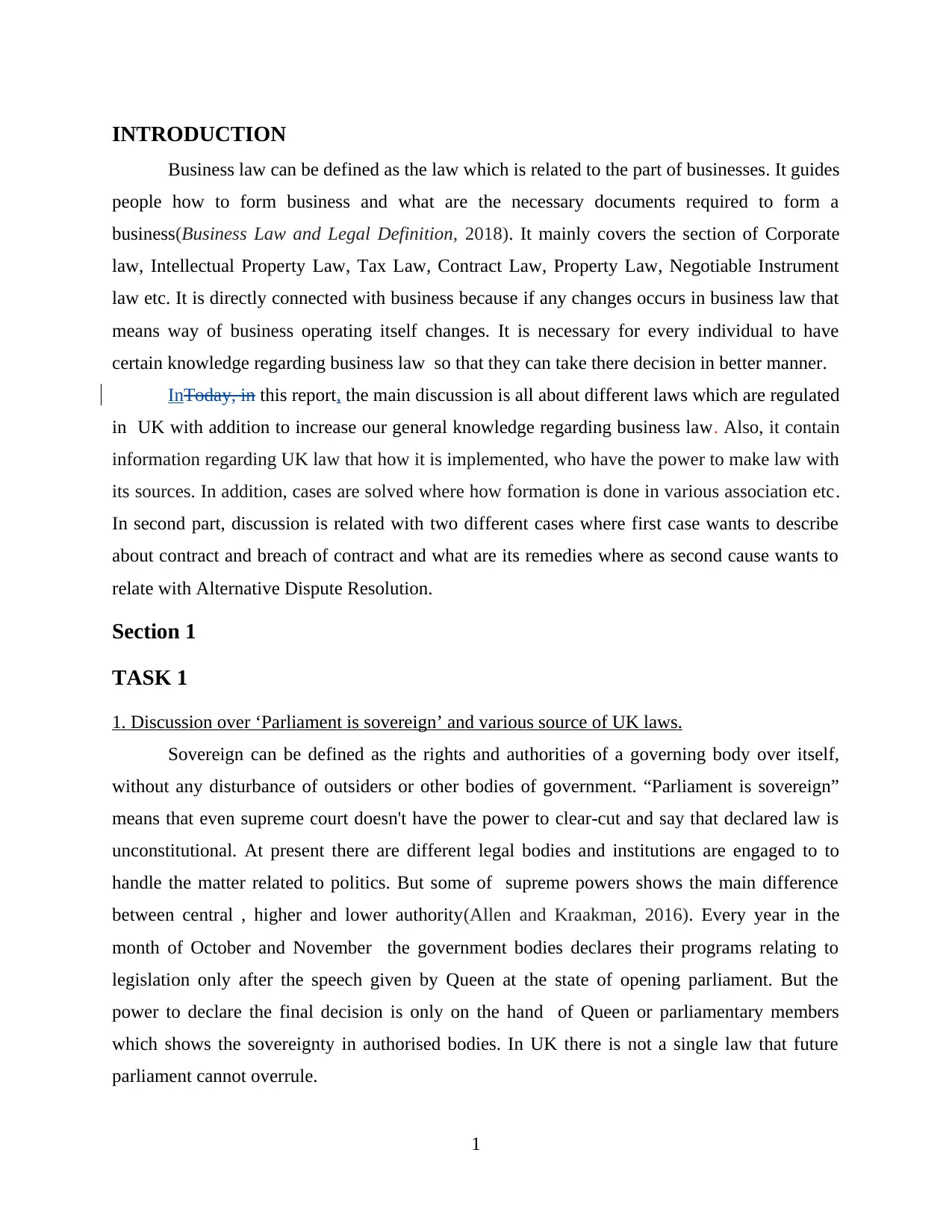
INTRODUCTION
Business law can be defined as the law which is related to the part of businesses. It guides
people how to form business and what are the necessary documents required to form a
business(Business Law and Legal Definition, 2018). It mainly covers the section of Corporate
law, Intellectual Property Law, Tax Law, Contract Law, Property Law, Negotiable Instrument
law etc. It is directly connected with business because if any changes occurs in business law that
means way of business operating itself changes. It is necessary for every individual to have
certain knowledge regarding business law so that they can take there decision in better manner.
InToday, in this report, the main discussion is all about different laws which are regulated
in UK with addition to increase our general knowledge regarding business law. Also, it contain
information regarding UK law that how it is implemented, who have the power to make law with
its sources. In addition, cases are solved where how formation is done in various association etc.
In second part, discussion is related with two different cases where first case wants to describe
about contract and breach of contract and what are its remedies where as second cause wants to
relate with Alternative Dispute Resolution.
Section 1
TASK 1
1. Discussion over ‘Parliament is sovereign’ and various source of UK laws.
Sovereign can be defined as the rights and authorities of a governing body over itself,
without any disturbance of outsiders or other bodies of government. “Parliament is sovereign”
means that even supreme court doesn't have the power to clear-cut and say that declared law is
unconstitutional. At present there are different legal bodies and institutions are engaged to to
handle the matter related to politics. But some of supreme powers shows the main difference
between central , higher and lower authority(Allen and Kraakman, 2016). Every year in the
month of October and November the government bodies declares their programs relating to
legislation only after the speech given by Queen at the state of opening parliament. But the
power to declare the final decision is only on the hand of Queen or parliamentary members
which shows the sovereignty in authorised bodies. In UK there is not a single law that future
parliament cannot overrule.
1
Business law can be defined as the law which is related to the part of businesses. It guides
people how to form business and what are the necessary documents required to form a
business(Business Law and Legal Definition, 2018). It mainly covers the section of Corporate
law, Intellectual Property Law, Tax Law, Contract Law, Property Law, Negotiable Instrument
law etc. It is directly connected with business because if any changes occurs in business law that
means way of business operating itself changes. It is necessary for every individual to have
certain knowledge regarding business law so that they can take there decision in better manner.
InToday, in this report, the main discussion is all about different laws which are regulated
in UK with addition to increase our general knowledge regarding business law. Also, it contain
information regarding UK law that how it is implemented, who have the power to make law with
its sources. In addition, cases are solved where how formation is done in various association etc.
In second part, discussion is related with two different cases where first case wants to describe
about contract and breach of contract and what are its remedies where as second cause wants to
relate with Alternative Dispute Resolution.
Section 1
TASK 1
1. Discussion over ‘Parliament is sovereign’ and various source of UK laws.
Sovereign can be defined as the rights and authorities of a governing body over itself,
without any disturbance of outsiders or other bodies of government. “Parliament is sovereign”
means that even supreme court doesn't have the power to clear-cut and say that declared law is
unconstitutional. At present there are different legal bodies and institutions are engaged to to
handle the matter related to politics. But some of supreme powers shows the main difference
between central , higher and lower authority(Allen and Kraakman, 2016). Every year in the
month of October and November the government bodies declares their programs relating to
legislation only after the speech given by Queen at the state of opening parliament. But the
power to declare the final decision is only on the hand of Queen or parliamentary members
which shows the sovereignty in authorised bodies. In UK there is not a single law that future
parliament cannot overrule.
1
Paraphrase This Document
Need a fresh take? Get an instant paraphrase of this document with our AI Paraphraser
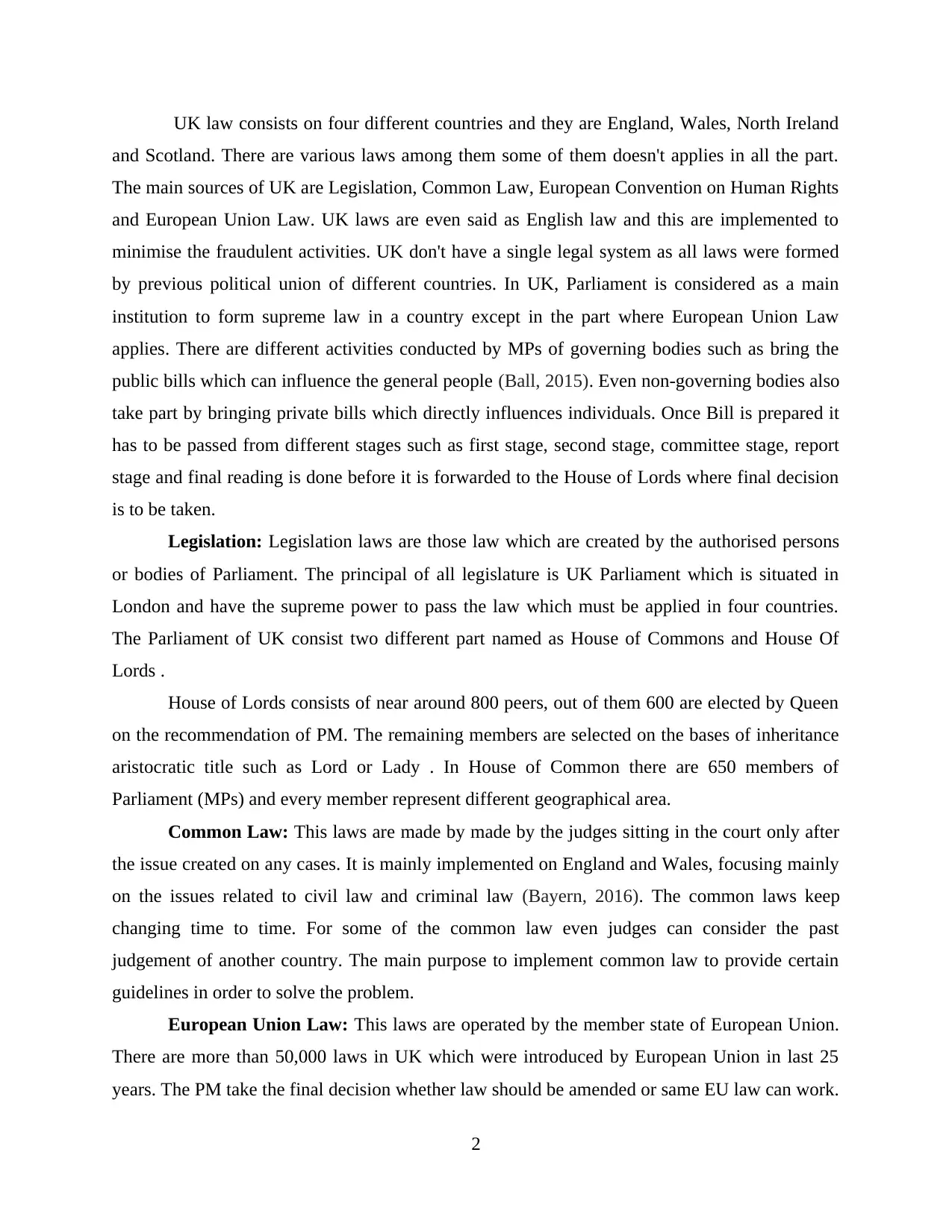
UK law consists on four different countries and they are England, Wales, North Ireland
and Scotland. There are various laws among them some of them doesn't applies in all the part.
The main sources of UK are Legislation, Common Law, European Convention on Human Rights
and European Union Law. UK laws are even said as English law and this are implemented to
minimise the fraudulent activities. UK don't have a single legal system as all laws were formed
by previous political union of different countries. In UK, Parliament is considered as a main
institution to form supreme law in a country except in the part where European Union Law
applies. There are different activities conducted by MPs of governing bodies such as bring the
public bills which can influence the general people (Ball, 2015). Even non-governing bodies also
take part by bringing private bills which directly influences individuals. Once Bill is prepared it
has to be passed from different stages such as first stage, second stage, committee stage, report
stage and final reading is done before it is forwarded to the House of Lords where final decision
is to be taken.
Legislation: Legislation laws are those law which are created by the authorised persons
or bodies of Parliament. The principal of all legislature is UK Parliament which is situated in
London and have the supreme power to pass the law which must be applied in four countries.
The Parliament of UK consist two different part named as House of Commons and House Of
Lords .
House of Lords consists of near around 800 peers, out of them 600 are elected by Queen
on the recommendation of PM. The remaining members are selected on the bases of inheritance
aristocratic title such as Lord or Lady . In House of Common there are 650 members of
Parliament (MPs) and every member represent different geographical area.
Common Law: This laws are made by made by the judges sitting in the court only after
the issue created on any cases. It is mainly implemented on England and Wales, focusing mainly
on the issues related to civil law and criminal law (Bayern, 2016). The common laws keep
changing time to time. For some of the common law even judges can consider the past
judgement of another country. The main purpose to implement common law to provide certain
guidelines in order to solve the problem.
European Union Law: This laws are operated by the member state of European Union.
There are more than 50,000 laws in UK which were introduced by European Union in last 25
years. The PM take the final decision whether law should be amended or same EU law can work.
2
and Scotland. There are various laws among them some of them doesn't applies in all the part.
The main sources of UK are Legislation, Common Law, European Convention on Human Rights
and European Union Law. UK laws are even said as English law and this are implemented to
minimise the fraudulent activities. UK don't have a single legal system as all laws were formed
by previous political union of different countries. In UK, Parliament is considered as a main
institution to form supreme law in a country except in the part where European Union Law
applies. There are different activities conducted by MPs of governing bodies such as bring the
public bills which can influence the general people (Ball, 2015). Even non-governing bodies also
take part by bringing private bills which directly influences individuals. Once Bill is prepared it
has to be passed from different stages such as first stage, second stage, committee stage, report
stage and final reading is done before it is forwarded to the House of Lords where final decision
is to be taken.
Legislation: Legislation laws are those law which are created by the authorised persons
or bodies of Parliament. The principal of all legislature is UK Parliament which is situated in
London and have the supreme power to pass the law which must be applied in four countries.
The Parliament of UK consist two different part named as House of Commons and House Of
Lords .
House of Lords consists of near around 800 peers, out of them 600 are elected by Queen
on the recommendation of PM. The remaining members are selected on the bases of inheritance
aristocratic title such as Lord or Lady . In House of Common there are 650 members of
Parliament (MPs) and every member represent different geographical area.
Common Law: This laws are made by made by the judges sitting in the court only after
the issue created on any cases. It is mainly implemented on England and Wales, focusing mainly
on the issues related to civil law and criminal law (Bayern, 2016). The common laws keep
changing time to time. For some of the common law even judges can consider the past
judgement of another country. The main purpose to implement common law to provide certain
guidelines in order to solve the problem.
European Union Law: This laws are operated by the member state of European Union.
There are more than 50,000 laws in UK which were introduced by European Union in last 25
years. The PM take the final decision whether law should be amended or same EU law can work.
2
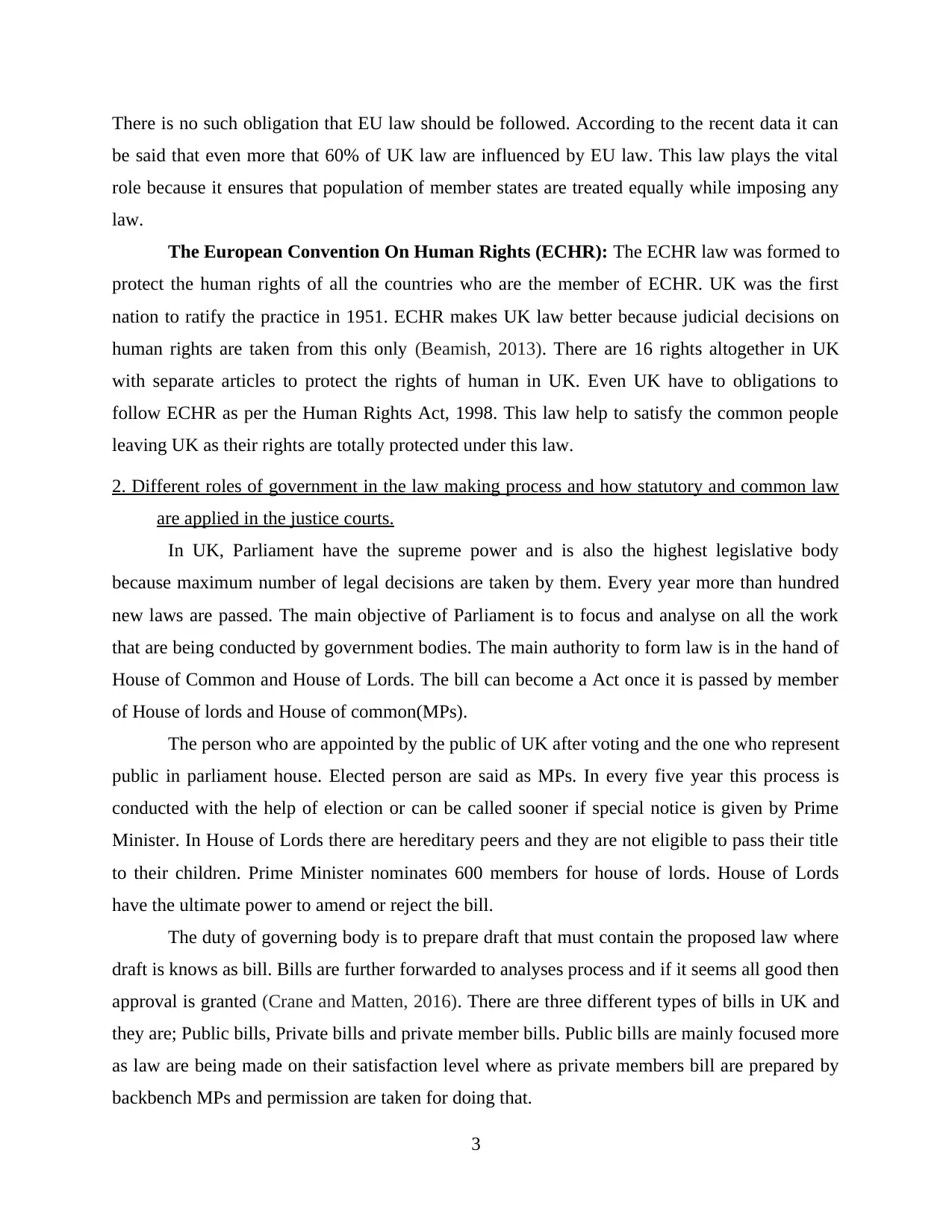
There is no such obligation that EU law should be followed. According to the recent data it can
be said that even more that 60% of UK law are influenced by EU law. This law plays the vital
role because it ensures that population of member states are treated equally while imposing any
law.
The European Convention On Human Rights (ECHR): The ECHR law was formed to
protect the human rights of all the countries who are the member of ECHR. UK was the first
nation to ratify the practice in 1951. ECHR makes UK law better because judicial decisions on
human rights are taken from this only (Beamish, 2013). There are 16 rights altogether in UK
with separate articles to protect the rights of human in UK. Even UK have to obligations to
follow ECHR as per the Human Rights Act, 1998. This law help to satisfy the common people
leaving UK as their rights are totally protected under this law.
2. Different roles of government in the law making process and how statutory and common law
are applied in the justice courts.
In UK, Parliament have the supreme power and is also the highest legislative body
because maximum number of legal decisions are taken by them. Every year more than hundred
new laws are passed. The main objective of Parliament is to focus and analyse on all the work
that are being conducted by government bodies. The main authority to form law is in the hand of
House of Common and House of Lords. The bill can become a Act once it is passed by member
of House of lords and House of common(MPs).
The person who are appointed by the public of UK after voting and the one who represent
public in parliament house. Elected person are said as MPs. In every five year this process is
conducted with the help of election or can be called sooner if special notice is given by Prime
Minister. In House of Lords there are hereditary peers and they are not eligible to pass their title
to their children. Prime Minister nominates 600 members for house of lords. House of Lords
have the ultimate power to amend or reject the bill.
The duty of governing body is to prepare draft that must contain the proposed law where
draft is knows as bill. Bills are further forwarded to analyses process and if it seems all good then
approval is granted (Crane and Matten, 2016). There are three different types of bills in UK and
they are; Public bills, Private bills and private member bills. Public bills are mainly focused more
as law are being made on their satisfaction level where as private members bill are prepared by
backbench MPs and permission are taken for doing that.
3
be said that even more that 60% of UK law are influenced by EU law. This law plays the vital
role because it ensures that population of member states are treated equally while imposing any
law.
The European Convention On Human Rights (ECHR): The ECHR law was formed to
protect the human rights of all the countries who are the member of ECHR. UK was the first
nation to ratify the practice in 1951. ECHR makes UK law better because judicial decisions on
human rights are taken from this only (Beamish, 2013). There are 16 rights altogether in UK
with separate articles to protect the rights of human in UK. Even UK have to obligations to
follow ECHR as per the Human Rights Act, 1998. This law help to satisfy the common people
leaving UK as their rights are totally protected under this law.
2. Different roles of government in the law making process and how statutory and common law
are applied in the justice courts.
In UK, Parliament have the supreme power and is also the highest legislative body
because maximum number of legal decisions are taken by them. Every year more than hundred
new laws are passed. The main objective of Parliament is to focus and analyse on all the work
that are being conducted by government bodies. The main authority to form law is in the hand of
House of Common and House of Lords. The bill can become a Act once it is passed by member
of House of lords and House of common(MPs).
The person who are appointed by the public of UK after voting and the one who represent
public in parliament house. Elected person are said as MPs. In every five year this process is
conducted with the help of election or can be called sooner if special notice is given by Prime
Minister. In House of Lords there are hereditary peers and they are not eligible to pass their title
to their children. Prime Minister nominates 600 members for house of lords. House of Lords
have the ultimate power to amend or reject the bill.
The duty of governing body is to prepare draft that must contain the proposed law where
draft is knows as bill. Bills are further forwarded to analyses process and if it seems all good then
approval is granted (Crane and Matten, 2016). There are three different types of bills in UK and
they are; Public bills, Private bills and private member bills. Public bills are mainly focused more
as law are being made on their satisfaction level where as private members bill are prepared by
backbench MPs and permission are taken for doing that.
3
⊘ This is a preview!⊘
Do you want full access?
Subscribe today to unlock all pages.

Trusted by 1+ million students worldwide
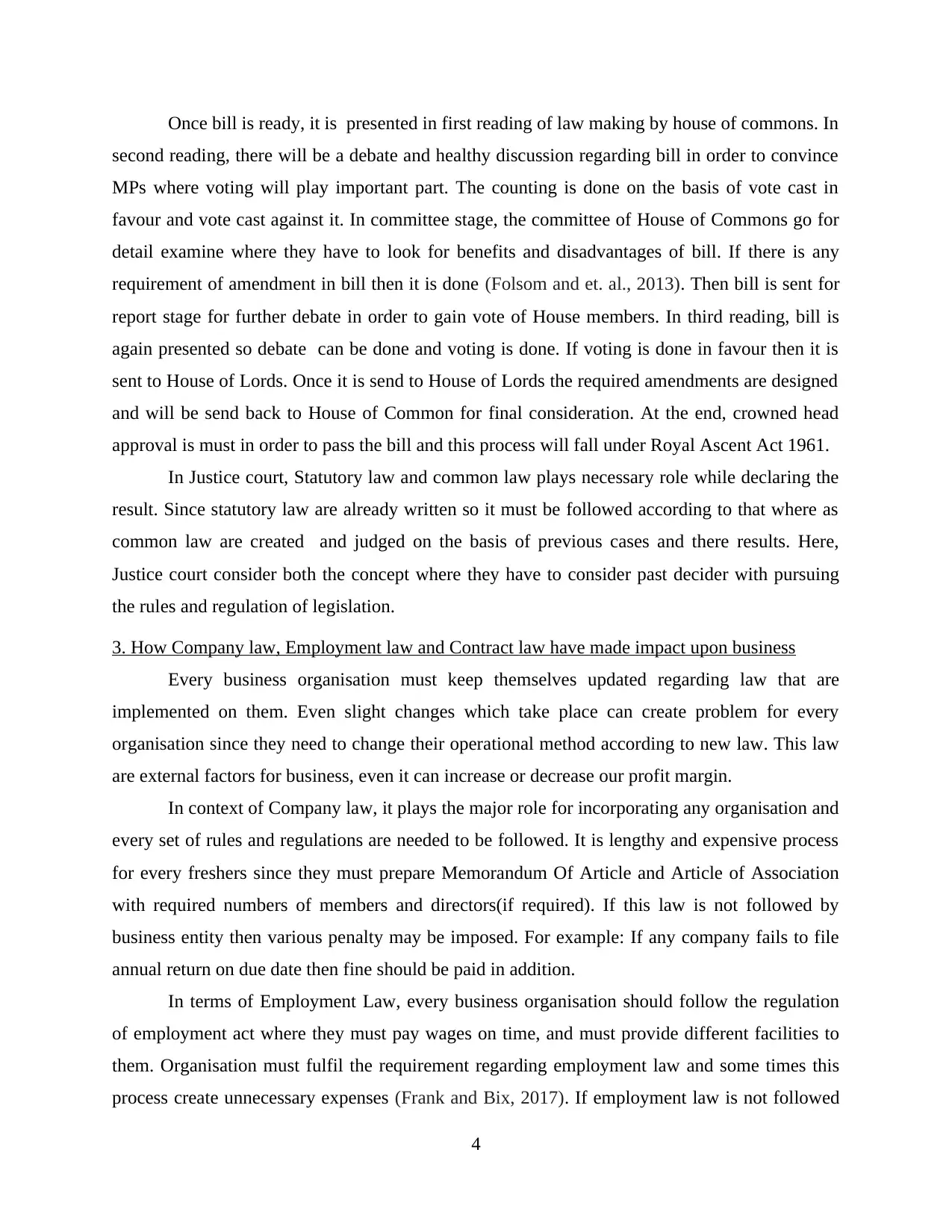
Once bill is ready, it is presented in first reading of law making by house of commons. In
second reading, there will be a debate and healthy discussion regarding bill in order to convince
MPs where voting will play important part. The counting is done on the basis of vote cast in
favour and vote cast against it. In committee stage, the committee of House of Commons go for
detail examine where they have to look for benefits and disadvantages of bill. If there is any
requirement of amendment in bill then it is done (Folsom and et. al., 2013). Then bill is sent for
report stage for further debate in order to gain vote of House members. In third reading, bill is
again presented so debate can be done and voting is done. If voting is done in favour then it is
sent to House of Lords. Once it is send to House of Lords the required amendments are designed
and will be send back to House of Common for final consideration. At the end, crowned head
approval is must in order to pass the bill and this process will fall under Royal Ascent Act 1961.
In Justice court, Statutory law and common law plays necessary role while declaring the
result. Since statutory law are already written so it must be followed according to that where as
common law are created and judged on the basis of previous cases and there results. Here,
Justice court consider both the concept where they have to consider past decider with pursuing
the rules and regulation of legislation.
3. How Company law, Employment law and Contract law have made impact upon business
Every business organisation must keep themselves updated regarding law that are
implemented on them. Even slight changes which take place can create problem for every
organisation since they need to change their operational method according to new law. This law
are external factors for business, even it can increase or decrease our profit margin.
In context of Company law, it plays the major role for incorporating any organisation and
every set of rules and regulations are needed to be followed. It is lengthy and expensive process
for every freshers since they must prepare Memorandum Of Article and Article of Association
with required numbers of members and directors(if required). If this law is not followed by
business entity then various penalty may be imposed. For example: If any company fails to file
annual return on due date then fine should be paid in addition.
In terms of Employment Law, every business organisation should follow the regulation
of employment act where they must pay wages on time, and must provide different facilities to
them. Organisation must fulfil the requirement regarding employment law and some times this
process create unnecessary expenses (Frank and Bix, 2017). If employment law is not followed
4
second reading, there will be a debate and healthy discussion regarding bill in order to convince
MPs where voting will play important part. The counting is done on the basis of vote cast in
favour and vote cast against it. In committee stage, the committee of House of Commons go for
detail examine where they have to look for benefits and disadvantages of bill. If there is any
requirement of amendment in bill then it is done (Folsom and et. al., 2013). Then bill is sent for
report stage for further debate in order to gain vote of House members. In third reading, bill is
again presented so debate can be done and voting is done. If voting is done in favour then it is
sent to House of Lords. Once it is send to House of Lords the required amendments are designed
and will be send back to House of Common for final consideration. At the end, crowned head
approval is must in order to pass the bill and this process will fall under Royal Ascent Act 1961.
In Justice court, Statutory law and common law plays necessary role while declaring the
result. Since statutory law are already written so it must be followed according to that where as
common law are created and judged on the basis of previous cases and there results. Here,
Justice court consider both the concept where they have to consider past decider with pursuing
the rules and regulation of legislation.
3. How Company law, Employment law and Contract law have made impact upon business
Every business organisation must keep themselves updated regarding law that are
implemented on them. Even slight changes which take place can create problem for every
organisation since they need to change their operational method according to new law. This law
are external factors for business, even it can increase or decrease our profit margin.
In context of Company law, it plays the major role for incorporating any organisation and
every set of rules and regulations are needed to be followed. It is lengthy and expensive process
for every freshers since they must prepare Memorandum Of Article and Article of Association
with required numbers of members and directors(if required). If this law is not followed by
business entity then various penalty may be imposed. For example: If any company fails to file
annual return on due date then fine should be paid in addition.
In terms of Employment Law, every business organisation should follow the regulation
of employment act where they must pay wages on time, and must provide different facilities to
them. Organisation must fulfil the requirement regarding employment law and some times this
process create unnecessary expenses (Frank and Bix, 2017). If employment law is not followed
4
Paraphrase This Document
Need a fresh take? Get an instant paraphrase of this document with our AI Paraphraser
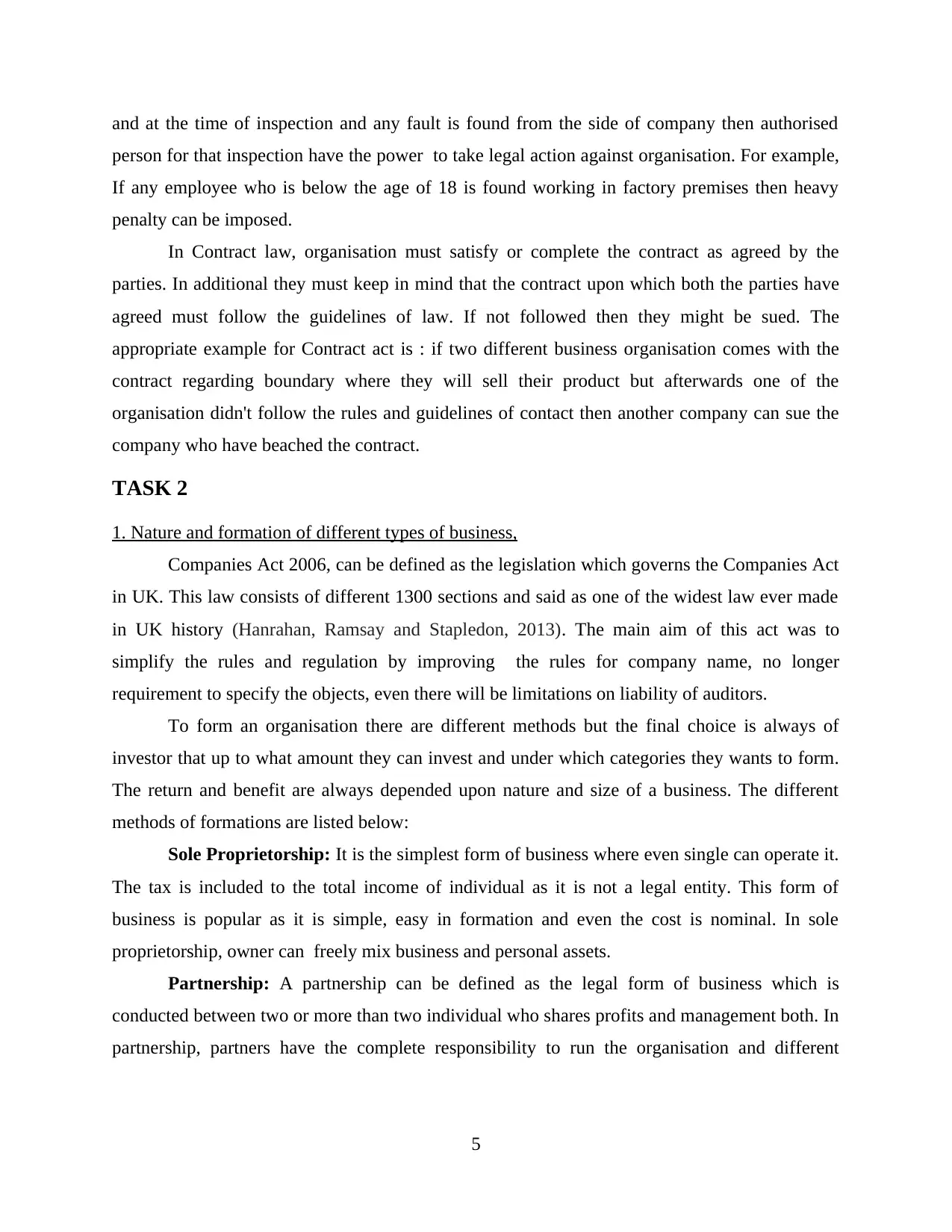
and at the time of inspection and any fault is found from the side of company then authorised
person for that inspection have the power to take legal action against organisation. For example,
If any employee who is below the age of 18 is found working in factory premises then heavy
penalty can be imposed.
In Contract law, organisation must satisfy or complete the contract as agreed by the
parties. In additional they must keep in mind that the contract upon which both the parties have
agreed must follow the guidelines of law. If not followed then they might be sued. The
appropriate example for Contract act is : if two different business organisation comes with the
contract regarding boundary where they will sell their product but afterwards one of the
organisation didn't follow the rules and guidelines of contact then another company can sue the
company who have beached the contract.
TASK 2
1. Nature and formation of different types of business,
Companies Act 2006, can be defined as the legislation which governs the Companies Act
in UK. This law consists of different 1300 sections and said as one of the widest law ever made
in UK history (Hanrahan, Ramsay and Stapledon, 2013). The main aim of this act was to
simplify the rules and regulation by improving the rules for company name, no longer
requirement to specify the objects, even there will be limitations on liability of auditors.
To form an organisation there are different methods but the final choice is always of
investor that up to what amount they can invest and under which categories they wants to form.
The return and benefit are always depended upon nature and size of a business. The different
methods of formations are listed below:
Sole Proprietorship: It is the simplest form of business where even single can operate it.
The tax is included to the total income of individual as it is not a legal entity. This form of
business is popular as it is simple, easy in formation and even the cost is nominal. In sole
proprietorship, owner can freely mix business and personal assets.
Partnership: A partnership can be defined as the legal form of business which is
conducted between two or more than two individual who shares profits and management both. In
partnership, partners have the complete responsibility to run the organisation and different
5
person for that inspection have the power to take legal action against organisation. For example,
If any employee who is below the age of 18 is found working in factory premises then heavy
penalty can be imposed.
In Contract law, organisation must satisfy or complete the contract as agreed by the
parties. In additional they must keep in mind that the contract upon which both the parties have
agreed must follow the guidelines of law. If not followed then they might be sued. The
appropriate example for Contract act is : if two different business organisation comes with the
contract regarding boundary where they will sell their product but afterwards one of the
organisation didn't follow the rules and guidelines of contact then another company can sue the
company who have beached the contract.
TASK 2
1. Nature and formation of different types of business,
Companies Act 2006, can be defined as the legislation which governs the Companies Act
in UK. This law consists of different 1300 sections and said as one of the widest law ever made
in UK history (Hanrahan, Ramsay and Stapledon, 2013). The main aim of this act was to
simplify the rules and regulation by improving the rules for company name, no longer
requirement to specify the objects, even there will be limitations on liability of auditors.
To form an organisation there are different methods but the final choice is always of
investor that up to what amount they can invest and under which categories they wants to form.
The return and benefit are always depended upon nature and size of a business. The different
methods of formations are listed below:
Sole Proprietorship: It is the simplest form of business where even single can operate it.
The tax is included to the total income of individual as it is not a legal entity. This form of
business is popular as it is simple, easy in formation and even the cost is nominal. In sole
proprietorship, owner can freely mix business and personal assets.
Partnership: A partnership can be defined as the legal form of business which is
conducted between two or more than two individual who shares profits and management both. In
partnership, partners have the complete responsibility to run the organisation and different
5
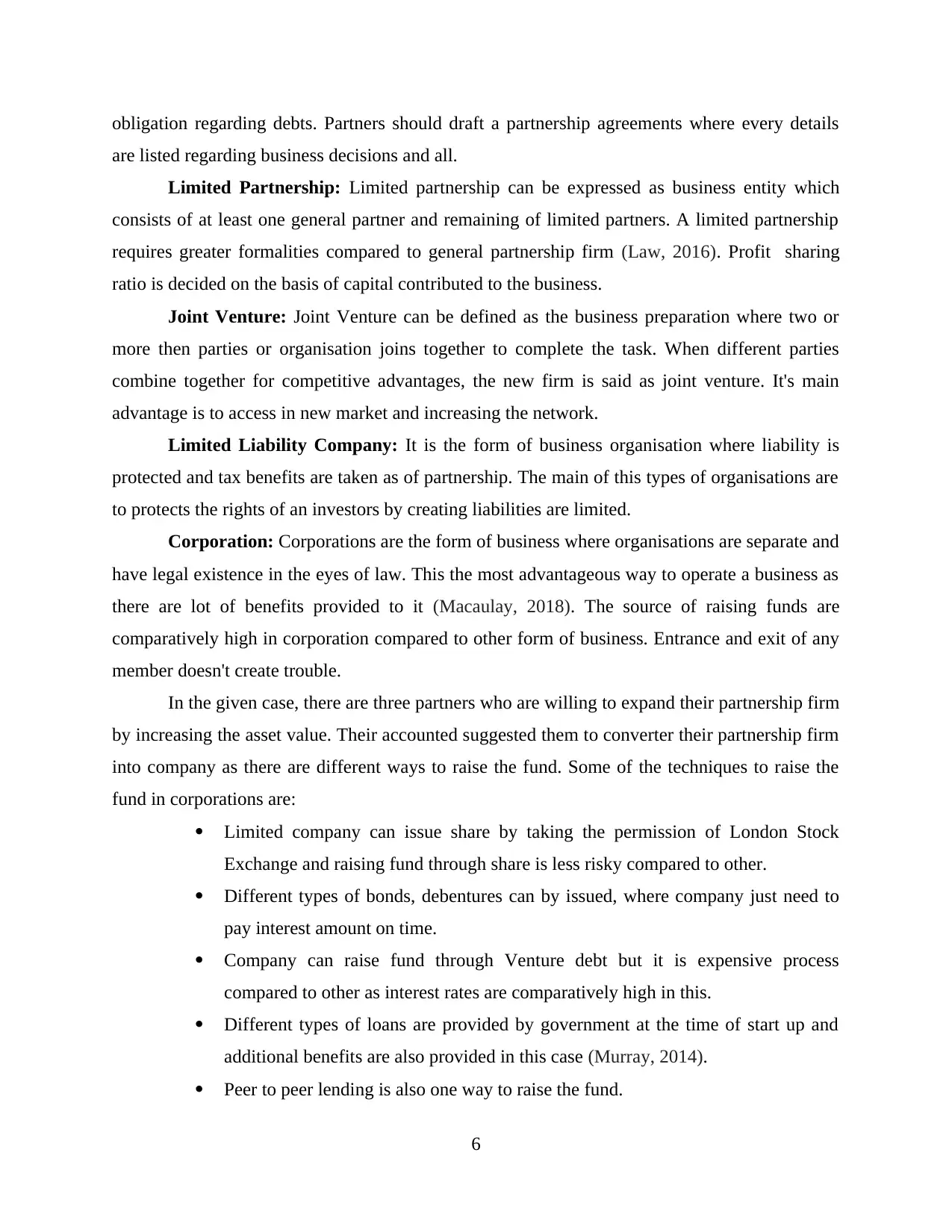
obligation regarding debts. Partners should draft a partnership agreements where every details
are listed regarding business decisions and all.
Limited Partnership: Limited partnership can be expressed as business entity which
consists of at least one general partner and remaining of limited partners. A limited partnership
requires greater formalities compared to general partnership firm (Law, 2016). Profit sharing
ratio is decided on the basis of capital contributed to the business.
Joint Venture: Joint Venture can be defined as the business preparation where two or
more then parties or organisation joins together to complete the task. When different parties
combine together for competitive advantages, the new firm is said as joint venture. It's main
advantage is to access in new market and increasing the network.
Limited Liability Company: It is the form of business organisation where liability is
protected and tax benefits are taken as of partnership. The main of this types of organisations are
to protects the rights of an investors by creating liabilities are limited.
Corporation: Corporations are the form of business where organisations are separate and
have legal existence in the eyes of law. This the most advantageous way to operate a business as
there are lot of benefits provided to it (Macaulay, 2018). The source of raising funds are
comparatively high in corporation compared to other form of business. Entrance and exit of any
member doesn't create trouble.
In the given case, there are three partners who are willing to expand their partnership firm
by increasing the asset value. Their accounted suggested them to converter their partnership firm
into company as there are different ways to raise the fund. Some of the techniques to raise the
fund in corporations are:
Limited company can issue share by taking the permission of London Stock
Exchange and raising fund through share is less risky compared to other.
Different types of bonds, debentures can by issued, where company just need to
pay interest amount on time.
Company can raise fund through Venture debt but it is expensive process
compared to other as interest rates are comparatively high in this.
Different types of loans are provided by government at the time of start up and
additional benefits are also provided in this case (Murray, 2014).
Peer to peer lending is also one way to raise the fund.
6
are listed regarding business decisions and all.
Limited Partnership: Limited partnership can be expressed as business entity which
consists of at least one general partner and remaining of limited partners. A limited partnership
requires greater formalities compared to general partnership firm (Law, 2016). Profit sharing
ratio is decided on the basis of capital contributed to the business.
Joint Venture: Joint Venture can be defined as the business preparation where two or
more then parties or organisation joins together to complete the task. When different parties
combine together for competitive advantages, the new firm is said as joint venture. It's main
advantage is to access in new market and increasing the network.
Limited Liability Company: It is the form of business organisation where liability is
protected and tax benefits are taken as of partnership. The main of this types of organisations are
to protects the rights of an investors by creating liabilities are limited.
Corporation: Corporations are the form of business where organisations are separate and
have legal existence in the eyes of law. This the most advantageous way to operate a business as
there are lot of benefits provided to it (Macaulay, 2018). The source of raising funds are
comparatively high in corporation compared to other form of business. Entrance and exit of any
member doesn't create trouble.
In the given case, there are three partners who are willing to expand their partnership firm
by increasing the asset value. Their accounted suggested them to converter their partnership firm
into company as there are different ways to raise the fund. Some of the techniques to raise the
fund in corporations are:
Limited company can issue share by taking the permission of London Stock
Exchange and raising fund through share is less risky compared to other.
Different types of bonds, debentures can by issued, where company just need to
pay interest amount on time.
Company can raise fund through Venture debt but it is expensive process
compared to other as interest rates are comparatively high in this.
Different types of loans are provided by government at the time of start up and
additional benefits are also provided in this case (Murray, 2014).
Peer to peer lending is also one way to raise the fund.
6
⊘ This is a preview!⊘
Do you want full access?
Subscribe today to unlock all pages.

Trusted by 1+ million students worldwide
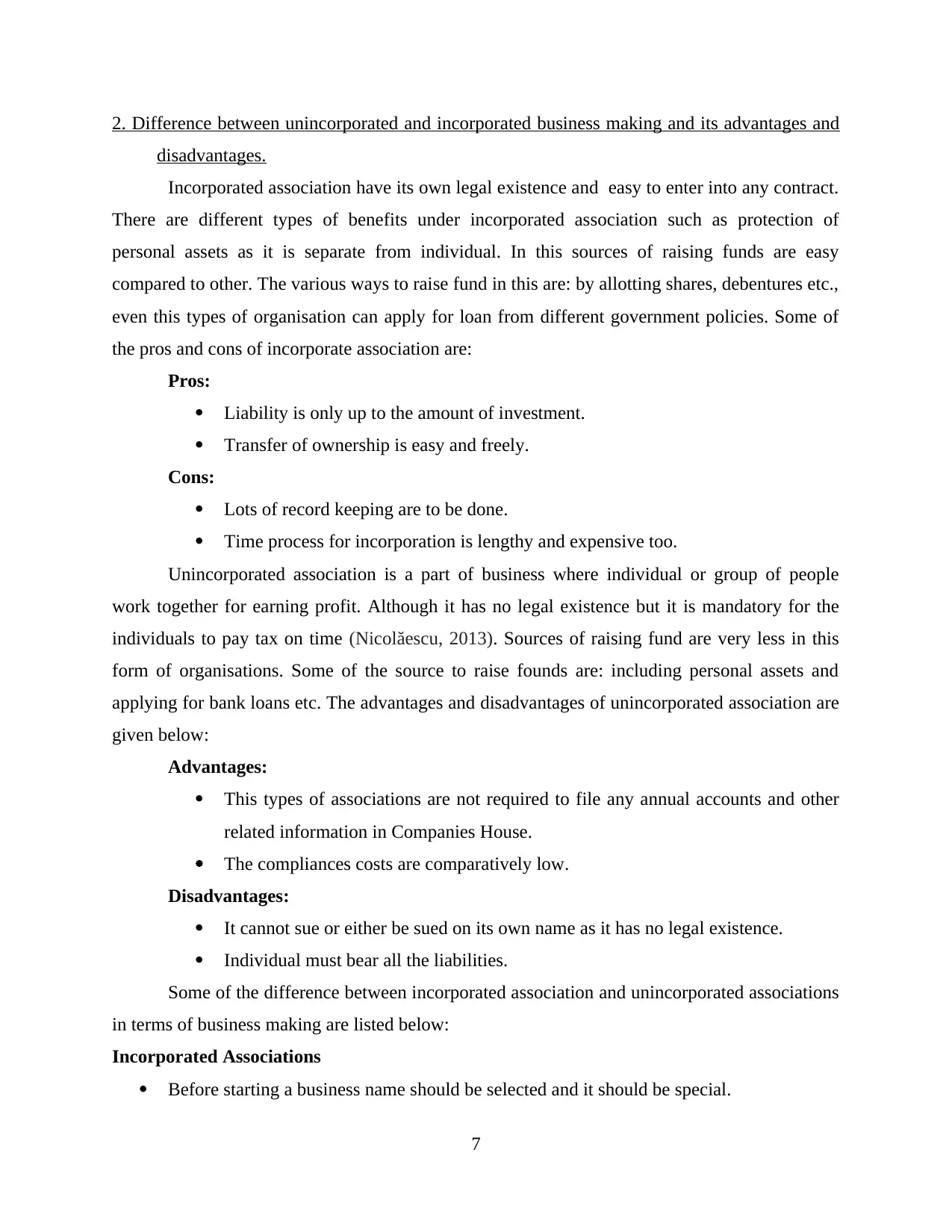
2. Difference between unincorporated and incorporated business making and its advantages and
disadvantages.
Incorporated association have its own legal existence and easy to enter into any contract.
There are different types of benefits under incorporated association such as protection of
personal assets as it is separate from individual. In this sources of raising funds are easy
compared to other. The various ways to raise fund in this are: by allotting shares, debentures etc.,
even this types of organisation can apply for loan from different government policies. Some of
the pros and cons of incorporate association are:
Pros:
Liability is only up to the amount of investment.
Transfer of ownership is easy and freely.
Cons:
Lots of record keeping are to be done.
Time process for incorporation is lengthy and expensive too.
Unincorporated association is a part of business where individual or group of people
work together for earning profit. Although it has no legal existence but it is mandatory for the
individuals to pay tax on time (Nicolăescu, 2013). Sources of raising fund are very less in this
form of organisations. Some of the source to raise founds are: including personal assets and
applying for bank loans etc. The advantages and disadvantages of unincorporated association are
given below:
Advantages:
This types of associations are not required to file any annual accounts and other
related information in Companies House.
The compliances costs are comparatively low.
Disadvantages:
It cannot sue or either be sued on its own name as it has no legal existence.
Individual must bear all the liabilities.
Some of the difference between incorporated association and unincorporated associations
in terms of business making are listed below:
Incorporated Associations
Before starting a business name should be selected and it should be special.
7
disadvantages.
Incorporated association have its own legal existence and easy to enter into any contract.
There are different types of benefits under incorporated association such as protection of
personal assets as it is separate from individual. In this sources of raising funds are easy
compared to other. The various ways to raise fund in this are: by allotting shares, debentures etc.,
even this types of organisation can apply for loan from different government policies. Some of
the pros and cons of incorporate association are:
Pros:
Liability is only up to the amount of investment.
Transfer of ownership is easy and freely.
Cons:
Lots of record keeping are to be done.
Time process for incorporation is lengthy and expensive too.
Unincorporated association is a part of business where individual or group of people
work together for earning profit. Although it has no legal existence but it is mandatory for the
individuals to pay tax on time (Nicolăescu, 2013). Sources of raising fund are very less in this
form of organisations. Some of the source to raise founds are: including personal assets and
applying for bank loans etc. The advantages and disadvantages of unincorporated association are
given below:
Advantages:
This types of associations are not required to file any annual accounts and other
related information in Companies House.
The compliances costs are comparatively low.
Disadvantages:
It cannot sue or either be sued on its own name as it has no legal existence.
Individual must bear all the liabilities.
Some of the difference between incorporated association and unincorporated associations
in terms of business making are listed below:
Incorporated Associations
Before starting a business name should be selected and it should be special.
7
Paraphrase This Document
Need a fresh take? Get an instant paraphrase of this document with our AI Paraphraser
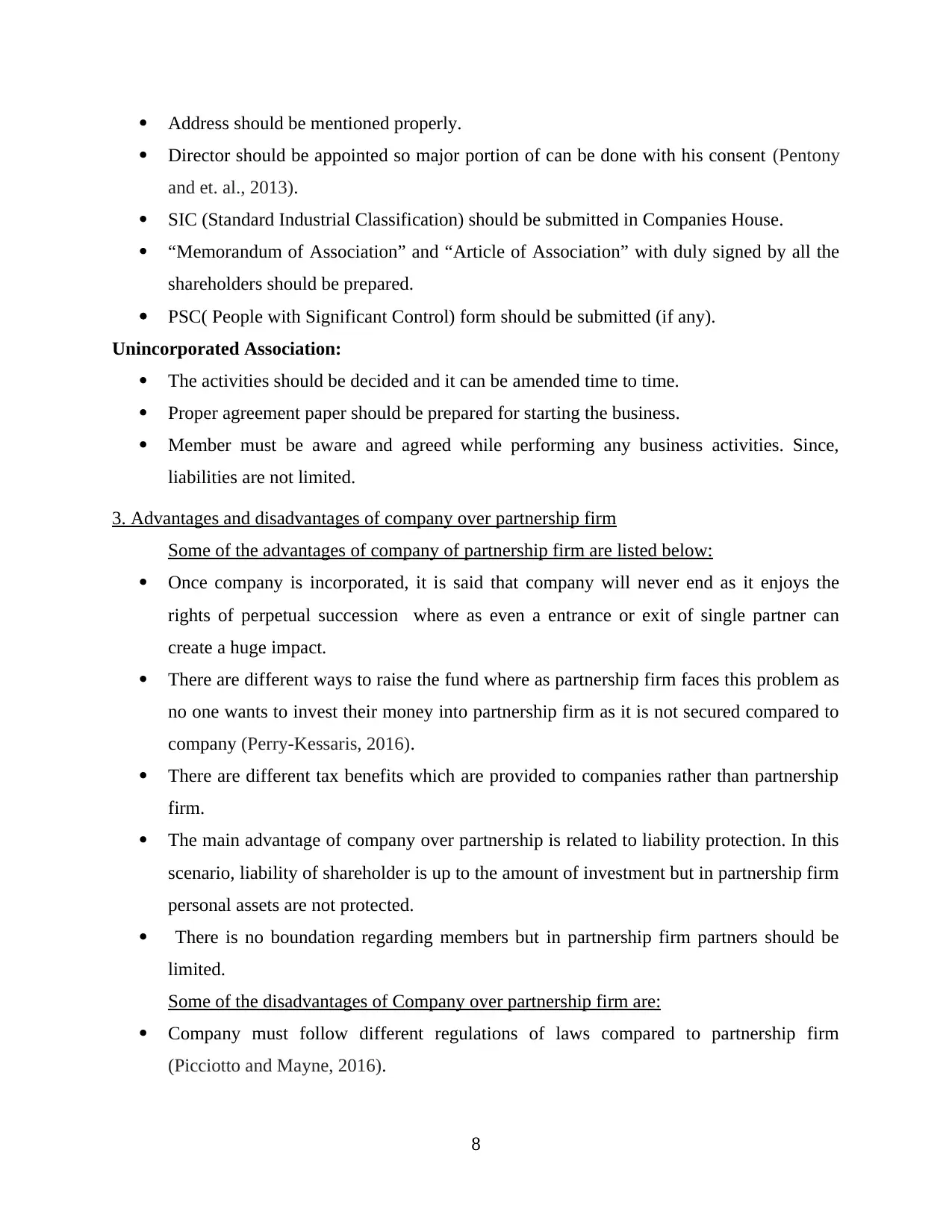
Address should be mentioned properly.
Director should be appointed so major portion of can be done with his consent (Pentony
and et. al., 2013).
SIC (Standard Industrial Classification) should be submitted in Companies House.
“Memorandum of Association” and “Article of Association” with duly signed by all the
shareholders should be prepared.
PSC( People with Significant Control) form should be submitted (if any).
Unincorporated Association:
The activities should be decided and it can be amended time to time.
Proper agreement paper should be prepared for starting the business.
Member must be aware and agreed while performing any business activities. Since,
liabilities are not limited.
3. Advantages and disadvantages of company over partnership firm
Some of the advantages of company of partnership firm are listed below:
Once company is incorporated, it is said that company will never end as it enjoys the
rights of perpetual succession where as even a entrance or exit of single partner can
create a huge impact.
There are different ways to raise the fund where as partnership firm faces this problem as
no one wants to invest their money into partnership firm as it is not secured compared to
company (Perry-Kessaris, 2016).
There are different tax benefits which are provided to companies rather than partnership
firm.
The main advantage of company over partnership is related to liability protection. In this
scenario, liability of shareholder is up to the amount of investment but in partnership firm
personal assets are not protected.
There is no boundation regarding members but in partnership firm partners should be
limited.
Some of the disadvantages of Company over partnership firm are:
Company must follow different regulations of laws compared to partnership firm
(Picciotto and Mayne, 2016).
8
Director should be appointed so major portion of can be done with his consent (Pentony
and et. al., 2013).
SIC (Standard Industrial Classification) should be submitted in Companies House.
“Memorandum of Association” and “Article of Association” with duly signed by all the
shareholders should be prepared.
PSC( People with Significant Control) form should be submitted (if any).
Unincorporated Association:
The activities should be decided and it can be amended time to time.
Proper agreement paper should be prepared for starting the business.
Member must be aware and agreed while performing any business activities. Since,
liabilities are not limited.
3. Advantages and disadvantages of company over partnership firm
Some of the advantages of company of partnership firm are listed below:
Once company is incorporated, it is said that company will never end as it enjoys the
rights of perpetual succession where as even a entrance or exit of single partner can
create a huge impact.
There are different ways to raise the fund where as partnership firm faces this problem as
no one wants to invest their money into partnership firm as it is not secured compared to
company (Perry-Kessaris, 2016).
There are different tax benefits which are provided to companies rather than partnership
firm.
The main advantage of company over partnership is related to liability protection. In this
scenario, liability of shareholder is up to the amount of investment but in partnership firm
personal assets are not protected.
There is no boundation regarding members but in partnership firm partners should be
limited.
Some of the disadvantages of Company over partnership firm are:
Company must follow different regulations of laws compared to partnership firm
(Picciotto and Mayne, 2016).
8
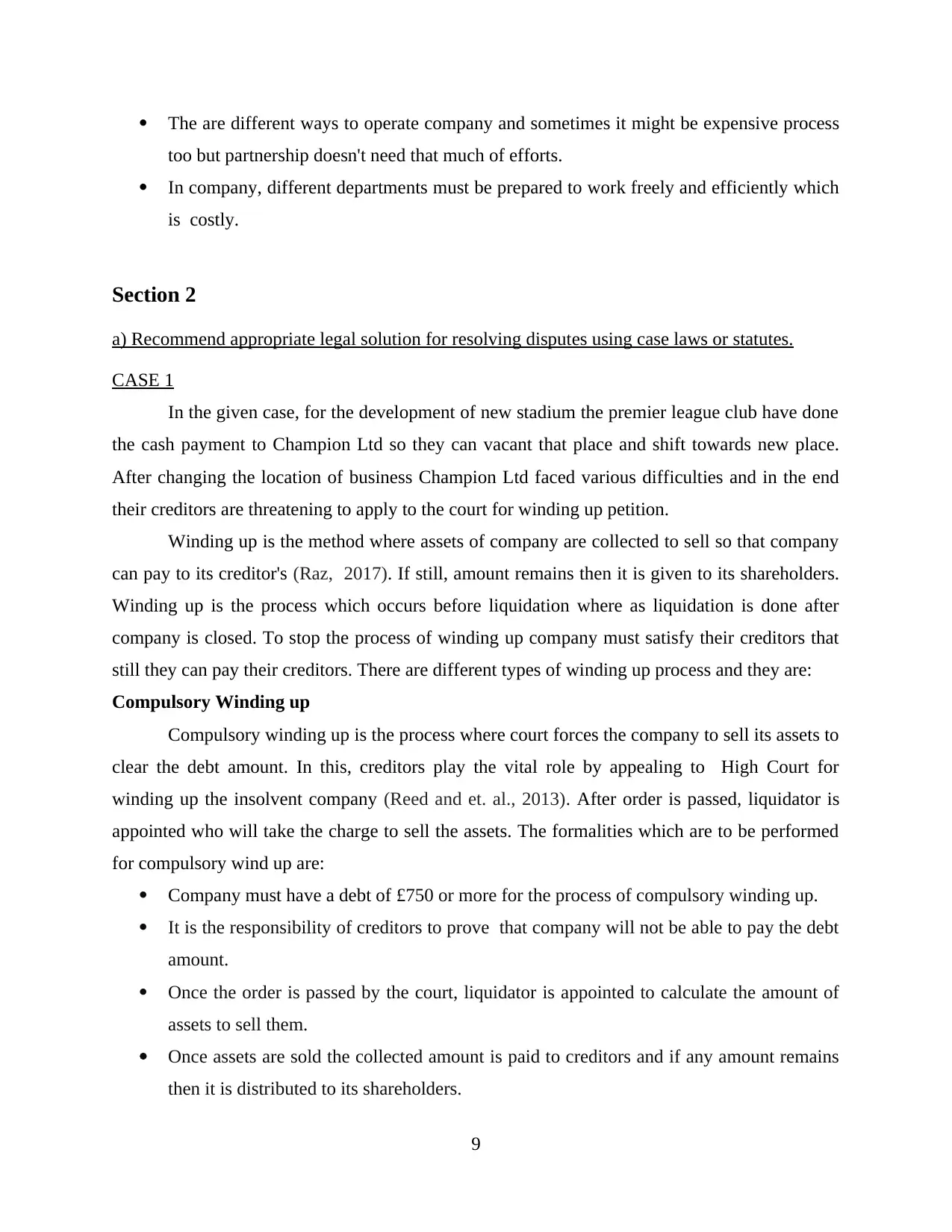
The are different ways to operate company and sometimes it might be expensive process
too but partnership doesn't need that much of efforts.
In company, different departments must be prepared to work freely and efficiently which
is costly.
Section 2
a) Recommend appropriate legal solution for resolving disputes using case laws or statutes.
CASE 1
In the given case, for the development of new stadium the premier league club have done
the cash payment to Champion Ltd so they can vacant that place and shift towards new place.
After changing the location of business Champion Ltd faced various difficulties and in the end
their creditors are threatening to apply to the court for winding up petition.
Winding up is the method where assets of company are collected to sell so that company
can pay to its creditor's (Raz, 2017). If still, amount remains then it is given to its shareholders.
Winding up is the process which occurs before liquidation where as liquidation is done after
company is closed. To stop the process of winding up company must satisfy their creditors that
still they can pay their creditors. There are different types of winding up process and they are:
Compulsory Winding up
Compulsory winding up is the process where court forces the company to sell its assets to
clear the debt amount. In this, creditors play the vital role by appealing to High Court for
winding up the insolvent company (Reed and et. al., 2013). After order is passed, liquidator is
appointed who will take the charge to sell the assets. The formalities which are to be performed
for compulsory wind up are:
Company must have a debt of £750 or more for the process of compulsory winding up.
It is the responsibility of creditors to prove that company will not be able to pay the debt
amount.
Once the order is passed by the court, liquidator is appointed to calculate the amount of
assets to sell them.
Once assets are sold the collected amount is paid to creditors and if any amount remains
then it is distributed to its shareholders.
9
too but partnership doesn't need that much of efforts.
In company, different departments must be prepared to work freely and efficiently which
is costly.
Section 2
a) Recommend appropriate legal solution for resolving disputes using case laws or statutes.
CASE 1
In the given case, for the development of new stadium the premier league club have done
the cash payment to Champion Ltd so they can vacant that place and shift towards new place.
After changing the location of business Champion Ltd faced various difficulties and in the end
their creditors are threatening to apply to the court for winding up petition.
Winding up is the method where assets of company are collected to sell so that company
can pay to its creditor's (Raz, 2017). If still, amount remains then it is given to its shareholders.
Winding up is the process which occurs before liquidation where as liquidation is done after
company is closed. To stop the process of winding up company must satisfy their creditors that
still they can pay their creditors. There are different types of winding up process and they are:
Compulsory Winding up
Compulsory winding up is the process where court forces the company to sell its assets to
clear the debt amount. In this, creditors play the vital role by appealing to High Court for
winding up the insolvent company (Reed and et. al., 2013). After order is passed, liquidator is
appointed who will take the charge to sell the assets. The formalities which are to be performed
for compulsory wind up are:
Company must have a debt of £750 or more for the process of compulsory winding up.
It is the responsibility of creditors to prove that company will not be able to pay the debt
amount.
Once the order is passed by the court, liquidator is appointed to calculate the amount of
assets to sell them.
Once assets are sold the collected amount is paid to creditors and if any amount remains
then it is distributed to its shareholders.
9
⊘ This is a preview!⊘
Do you want full access?
Subscribe today to unlock all pages.

Trusted by 1+ million students worldwide
1 out of 17
Related Documents
Your All-in-One AI-Powered Toolkit for Academic Success.
+13062052269
info@desklib.com
Available 24*7 on WhatsApp / Email
![[object Object]](/_next/static/media/star-bottom.7253800d.svg)
Unlock your academic potential
Copyright © 2020–2026 A2Z Services. All Rights Reserved. Developed and managed by ZUCOL.





